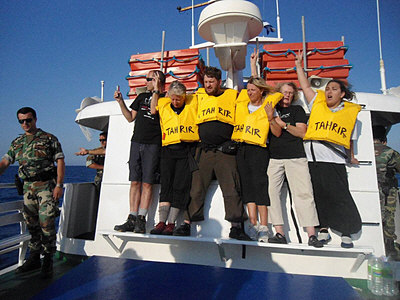One year after the Greek government bowed to pressure and enforced he outsourced Israeli blockade of Gaza, the international movement to challenge the blockade is still very much afloat: we may change our tactics, but not our objectives. Our new campaign to challenge the blockade from the inside out emphasizes the fundamental importance of freedom of movement for Palestinians.
On July 4, 2011 the Canadian boat Tahrir left the port of Aghios Nikolaos (in Crete, Greece) bound for Gaza. After days of waiting for official clearance in the face of increasing bureaucratic and political obstacles, we decided to defy a Greek government ban on Freedom Flotilla departures and simply cast off. There were more than 40 people on board the Tahrir: a wide range of delegates from Australia, Belgium, Denmark and Canada as well as journalists from various countries. Our Greek captain and crew had been replaced for the occasion by volunteers — we were lucky to have among us delegates with professional maritime experience, from engineer to ship’s officers.
We didn’t make it more than eight nautical miles out before the Greek coastguard commandos boarded the Tahrir and took control of the vessel. We were towed back to port where a three people from our group had been arrested (they were subsequently tried and given suspended sentences). The Greeks used minimal force in stopping the Tahrir. They did not interfere with communications nor with media reporting – cameras and live phone interviews were rolling throughout the whole process. Some of the coastguard commandos in fact said they were embarrassed by what they saw as their government’s betrayal of Greece’s traditional Mid-East position.
By accepting to play the role of unenthusiastic enforcers for Israel’s outsourced blockade of Gaza, then-Prime Minister Papandreou was indeed betraying his father Andreas’ historical support for Palestinian liberation. All the pandering to powerful international forces could not of course save the younger Papandreou’s job as PM from the pressures of the austerity agenda, and it remains to be seen whether present or future Greek governments will return to a more independent foreign policy. Meanwhile, we remain more buoyant about our internationalanti-blockade movement than about the Greek political situation.
When the Tahrir sailed again in November, this time from Turkey and with a much reduced delegation (just 12 people on board), we got much further before being captured by the Israeli navy in international waters just 45 nautical miles from Gaza. In stark contract to the Greeks, the Israeli navy began by blocking all communications and throughout did everything possible to prevent journalists on board from doing their work by reporting. By stealing media professionals’ recording equipment, the Israelis showed once again they know their actions are illegal and indefensible.
Despite recognizing that there were no arms or munitions of any kind on the Tahrir and that they would be met with only non-violent resistance, the heavily armed commandos boarded us with overwhelming military force, an act of state-sponsored piracy.
The Tahrir and the Saoirse are still illegally impounded in Israel, along with at least five other boats from different countries which have challenged the blockade since 2009 (after the six successful voyages to Gaza in 2008). We have filed a legal request for the release of our boat and its content but we know the Tahrir faces more delays before we can deliver this gift from Canadian civil society to the Palestinians of Gaza. The U.S. boat to Gaza, the Audacity of Hope has been impounded since last year by the Greek authorities, along with three other vessels.
A few Greek and Turkish boats from the 2010 Freedom Flotilla were finally returned, heavily damaged, from Israeli captivity, and the French campaign Un Bateau français pour Gaza, has filed legally against Israeli authorities for piracy, kidnapping and theft following the illegal capture of their boat Dignité Al-Karama last July. Meanwhile the commercial sailing ship Estelle is making its way from Scandinavia through the ports of Europe to the Mediterranean in order to challenge the blockade. So our international civil society movement against the blockade of Gaza remains very much afloat.
Launched in May 2012, Gaza’s Ark is a new campaign in cooperation with organizations and individuals in Palestine, Canada, Australia and the U.S. which aims to build hope on the ground in Gaza in order to sail from Palestine against the blockade. It is not an “aid” project but rather an affirmation of the ability of the Palestinians of Gaza to rebuild their productive export economy, once they regain their freedom of movement. We are funding a boat to be sailed out of Gaza (the only Mediterranean port closed to shipping) by internationals and Palestinians to transport Palestinian products to complete trade deals with international buyers.
Importantly, outbound export trade from Palestine cannot be portrayed as threatening anyone’s security. But it does affirm a very basic human right systematically denied to Palestinians by the Israeli occupation: the freedom of movement within as well as in and out of their country. It also supports the Palestinian fishery’s right to operate in Palestinian territorial waters off Gaza for their livelihood, also threatened daily by the same blockade we are challenging.
Five independent human rights experts reporting to the U.N. Human Rights Council reiterated in September 2011 that the blockade of Gaza is illegal under international law. Until the governments of the world take up their responsibilities towards Palestinian civilians and demand that Israel comply with international law, civil society movements like ours maintain our sights steadily fixed on freedom of movement for all Palestinians. Our tactics may change but our course remains the conscience of humanity.
Linguistics professor David Heap and IT engineer & poet Ehab Lotayef are steering committee members with the Canadian Boat for Gaza and Gaza’s Ark. They were on the Tahrir when it was attacked and seized last November and spent six days in Israeli prison before being deported back to Canada.



